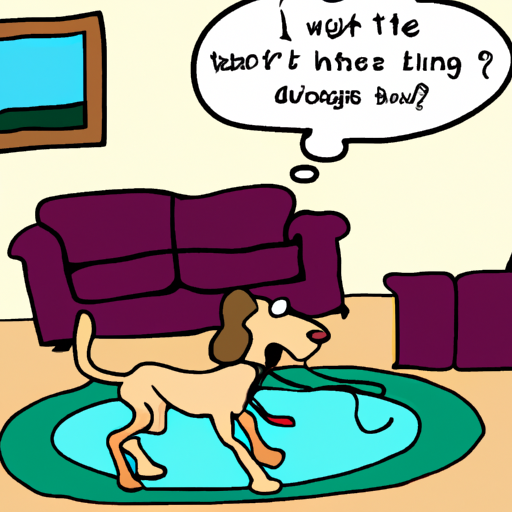As a caregiver, you’ve likely noticed your canine companion engaging in some odd behaviors. One in particular that may have caught your attention is your dog scooting or dragging its hind end across the carpet. This peculiar activity may seem funny at first, but it can actually be a sign that your dog is uncomfortable.
H2: Understanding the Motivation Behind Scooting
Dogs scoot on the carpet to relieve discomfort or itchiness in their anal area. This behavior can be due to a variety of health issues, which we’ll explore in detail in the following sections. Remember, while it might be amusing to watch, it’s important to take your dog’s scooting seriously and seek veterinary help if necessary.
- Anal Gland Issues: The most common reason dogs scoot is due to issues with their anal glands. These are two small, pea-sized sacs located on either side of your dog’s rectum. They’re filled with a smelly fluid that dogs use to mark their territory. Sometimes, these glands can become impacted or infected, causing discomfort and prompting your dog to scoot.
- Parasites: Parasites like tapeworms or pinworms can also cause your dog to scoot. These critters can irritate your dog’s anus, causing discomfort or itchiness.
- Allergies: Allergies can also cause anal itchiness and consequent scooting. Dogs can be allergic to a variety of things, from certain foods to grass or pollen.
- Injuries or Infections: An injury or infection in the anal area can also prompt scooting. This could be anything from a small cut to an anal fissure or a perianal fistula.
H2: How to Identify the Cause of Scooting
Identifying the cause of your dog’s scooting is the first step towards addressing the issue. Here’s how you can do it:
-
Check for Visible Signs of Discomfort: Look for redness, swelling, or discharge in your dog’s anal area. These could be signs of an infection or injury.
-
Look for Parasites: Some parasites are visible to the naked eye. Tapeworms, for example, can appear as small, white segments in your dog’s feces.
-
Observe Changes in Behavior: Changes in your dog’s behavior can also indicate a problem. If your dog is scooting and also seems lethargic, is vomiting, or has diarrhea, it’s time to see the vet.
-
Consult a Vet: If you can’t identify the cause of the scooting, it’s best to consult a vet. They can perform a thorough exam and run tests to determine what’s causing your dog’s discomfort.
H2: How to Prevent and Treat Scooting
Preventing and treating scooting involves addressing the underlying issue causing the discomfort. Here’s what you can do:
-
Maintain Regular Vet Check-ups: Regular vet check-ups can help identify and address any health issues before they become serious.
-
Provide a Balanced Diet: A balanced diet can help prevent digestive issues and keep your dog’s anal glands healthy.
-
Regular Deworming: Regular deworming can prevent parasitic infestations.
-
Grooming and Hygiene: Regular grooming and maintaining hygiene can help prevent infections and injuries to the anal area.
H2: When to Seek Veterinary Help
If your dog’s scooting persists despite your best efforts, or if you notice any of the following symptoms, it’s time to seek veterinary help:
- Persistent scooting
- Signs of pain or discomfort
- Blood in the stool
- Changes in appetite or behavior
- Swelling or discharge in the anal area
FAQs
Q: Can scooting harm my dog?
A: Yes, excessive scooting can cause abrasions and infections in the anal area. It’s also a sign of discomfort, which means your dog isn’t feeling well.
Q: How often should I deworm my dog?
A: The frequency of deworming depends on your dog’s lifestyle and risk factors. Consult your vet for a tailored deworming schedule.
Q: Can I express my dog’s anal glands at home?
A: While it’s technically possible, it’s generally not recommended. If done improperly, it can cause harm to your dog. It’s best left to the professionals.
Q: Can a change in diet help with scooting?
A: Yes, a balanced diet can help maintain healthy digestion and reduce the likelihood of anal gland issues. Talk to your vet about the best diet for your dog.



